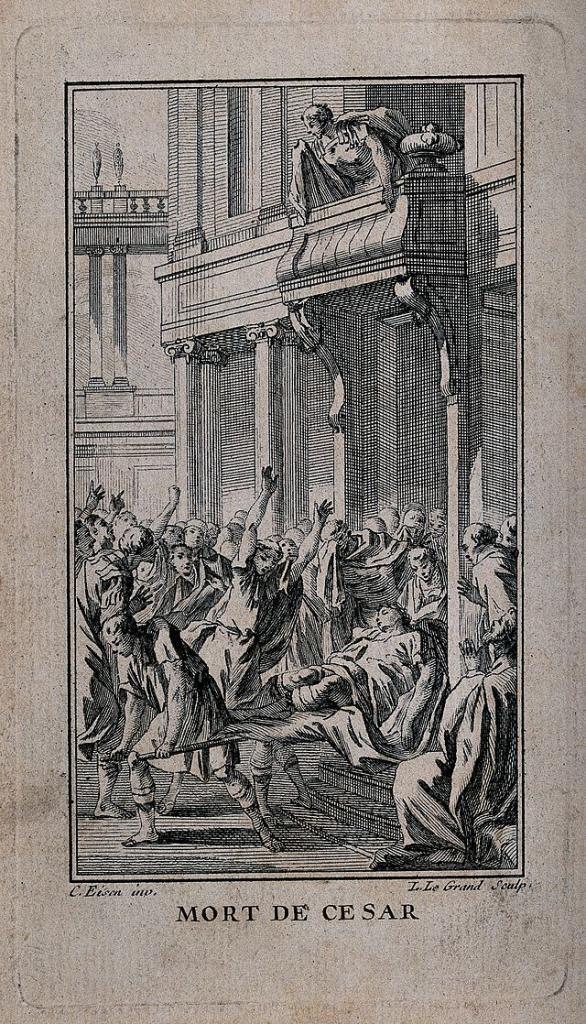
Engraving by L Le Grand
after C Eisen
Be fearful of exalted rank, o soul.
And if you are unable to subdue
your aspirations — doubtingly pursue them
and with precautions. And the more you rise,
the more examining, the warier be.
And when you are arrived at the supreme
height of your glory — a Caesar, as it were:
when you are become a man so widely famed:
then specially be wary — at such time
as you come out into the thoroughfares,
a noted ruler with great following:
if peradventure, from the multitude,
some friendly person, an Artemidorus,
bringing a paper, should press near to you
and rap out sharp “Read this without delay;
herein are weighty matters touching you”,
fail not to tarry; fail not to postpone
all talk or business; fail not to turn off
the different hangers-on who bow and scrape,
(you will attend to them in time); let even
the Senate wait; — leave all, and learn at once
the grave things written by Artemidorus.
C. P. Cavafy
Ah, the Ides of March.
It’s the 74th day in the Roman calendar, corresponding to our 15th of March. Close enough, anyway. For the Romans it was a religious holiday, and notably a day to settle debts. Perhaps now it’s better known in some circles as International kill a tyrant day.
It was, after all, as we all know, that on the 15th of March, the Ides of March in the year 44 before our common era that Julius Caesar was killed, marking one of those moments in history where everything changed.
It was, after all, the great marker of the end of the Roman Republic. An historical turning many of us will be familiar with. Civil war would break out following the assassination. And as the dust, pooled in blood, settled into a sticky mess, Caesar’s adoptive heir would claim what would become a throne. For the west the Throne for a very long time.
And here we are in our own little moment of turning. With the rise of authoritarians and right out dictators, usually the distinctions being too small to discern. All around the globe. And with some serious flirting with the idea right here in the good old US of A. There seems a solid plurality willing to consider some kind of autocracy so long as it results in the world they want. Or, is promised by the would be autocrat.
For me the Ides is a regular reminder that we’re always called to make choices. Action or no action there are consequences. And, well, where do we choose to be? Although, honestly, somehow the story of Caesar and Octavian and Marc Antony and Cleopatra and the host around them feel less compelling to me. Instead, I find a different story rising in my heart.
A month later and about two thousand years later, very early on an April morning day after a very quick trial before an SS judge, the Reverend Dietrich Bonhoeffer was stripped naked, marched to the place of execution, and hung. It is unclear whether he had been tortured before, but historians are increasingly of the opinion that he was. Possibly for as long as six hours.
A leader of the Confessing Church, Bonhoeffer had been convicted of joining in a conspiracy to assassinate Adolf Hitler. It probably doesn’t matter that while he was active in the Resistance, there doesn’t appear to be evidence he was actively involved in any assassination plot.
But he was close to the fire. That’s for sure.
Today he is remembered as an inspiration for future leaders of faith standing up in opposition to various tyrannies. And I find myself thinking of him and his choices and the consequences that followed.
It is a very dangerous walk between Scylla and Charybdis, this choosing to resist evil. For me that other image, engaging in the world, facing evils of several sorts, that’s standing close to a fire.
Religions. Politics. A dangerous mix. It’s marked with a lot of bad choices, and unintended consequences. And the possibilities of everything being consumed in the flames remain very real. And. Sort of like the rest of our lives?
The killers of Julius Caesar wanted to sustain a republic. They ended up with an emperor. Bonhoeffer made a hard choice to stand up to evil. And.
But. When the world is on fire? What to do? What do we do? You and I? As I see it, to reach for another image, to touch the importance and difficulty; pick your poison. But pick we must.
That’s the big question. We’re all of us going to die. The question is how do we live? We don’t pick our moment in history. We only pick how we will meet it.
To breathe is to act. So, recalling the ill that will follow any action, I feel called to listen, to fall into that place of not knowing, to hesitate. So much in that moment. This unknowing is the gateway to all. And then, to do my best. To act.
I’m not terribly interested in Marcus Junius Brutus’ choices. But I’m deeply called to Dietrich Bonhoeffer’s.
And. Whatever. Whatever, it’s all standing close to the fire. Both men ended up dying.
The thirteenth century Zen master Eihei Dogen in his youth struggled with the assertion that we are all of us already awakened. So, he asked, why practice? It was his original koan. The question that drove his heart.
He ended up awakening to the fact his Zen practice was awakening.
Of course it goes further than the details of our practice. And here’s the point as we meet this moment of our lives.
The great catastrophe. Is our practice. Is our awakening.
Choices. Actions. Consequences. Most of them unintended. There is no separation. This is our awakening.
We have tools. We have guidelines.
And. Here we are. No separation. So.
So, what will you do?














